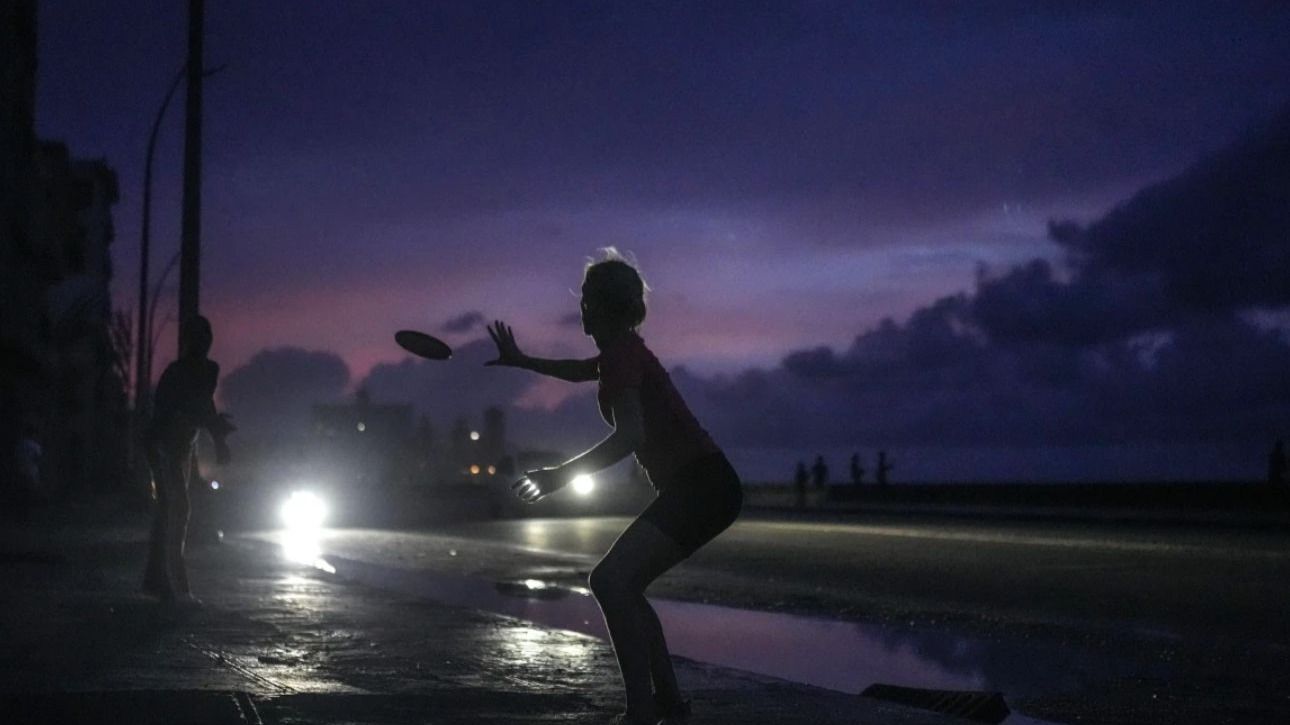HAVANA: Many Cubans waited in anguish Sunday night as electricity to much of the island had yet to be restored days after a nationwide blackout. Their concerns increased when Hurricane Oscar hit the eastern coast of Cuba, battering it with strong winds and rain.
Energy Minister Vicente de la O Levy said at a press conference that he expects the country’s power grid to be restored on Monday or Tuesday morning.
But he acknowledged that Oscar, which hit Cuba’s eastern coast on Sunday night, will bring “an additional inconvenience” to Cuba’s recovery, since it will hit a “region of strong (electrical) generation.” Key Cuban power plants are located in the area, such as Felton in the city of Holguín and Renté in Santiago de Cuba.
Rain and thunderstorms were reported in Cuba’s eastern provinces and strong two-meter waves lashed the seafront of the city of Baracoa, near where Oscar made landfall. No deaths have been reported so far, but local media reported damage to ceilings and walls.
Power was restored to some neighborhoods in Cuba’s capital, home to 2 million people, but most of Havana remained dark. The impact of the blackout goes beyond lighting, as services such as water supply also rely on electricity to run pumps.
People resorted to cooking on makeshift wood stoves on the streets before food spoiled in refrigerators.
Through tears, Ylenis de la Caridad Nápoles, mother of a 7-year-old girl, says she is reaching a point of “despair.”
The failure of the Antonio Guiteras plant on Friday, which caused the island’s entire system to collapse, was just the latest in a series of problems with power distribution in a country where electricity has been restricted and rotated to different regions. at different times of the year. day.
People queued for hours on Sunday to buy bread at the few bakeries that were allowed to reopen.
Some Cubans like Rosa Rodríguez have been without electricity for four days.
“We have millions of problems and none of them are solved,” said Rodríguez. “We have to come get bread, because the local bakery is closed and they bring it from somewhere else.”
About half of Cuba was plunged into darkness on Thursday night, and the entire island on Friday morning after one of the plants failed.
In addition to the Antonio Guiteras plant, whose failure on Friday affected the entire national system, Cuba has several others, and it was not immediately clear if they were still operating.
The blackout was considered the worst Cuba has suffered in two years after Hurricane Ian made landfall as a Category 3 storm in 2022 and damaged electrical installations. It took the government days to fix them. This year, some homes have gone up to eight hours a day without power.
Cuba’s government had said on Saturday that some electricity had been restored after one of the country’s main power plants failed. But the island’s 500 megawatts of power grid power, well below the usual 3 gigawatts it needs, was quickly reduced to 370 megawatts.
Even in a country accustomed to blackouts as part of a deepening economic crisis, Friday’s collapse was massive.
The Cuban government has announced emergency measures to reduce demand for electricity, including suspending classes at schools and universities, closing some state workplaces and canceling non-essential services.
Local authorities said the outage was due to increased demand from small and medium-sized businesses and residential air conditioners. Subsequently, the blackout was worsened by breakdowns in old thermoelectric plants that have not been adequately maintained, and by the lack of fuel to operate some facilities.
Cuba’s energy minister said the country’s grid would be in better shape if there had not been two more partial blackouts when authorities tried to reconnect on Saturday. De la O Levy also said that Mexico, Colombia, Venezuela and Russia, among other nations, had offered to help.
The U.S. National Hurricane Center said Oscar made landfall on the east coast of Cuba after hitting the southeastern Bahamas earlier in the day. The center said the center of the storm hit Guantánamo province, near Baracoa, on Sunday night. Its maximum sustained winds were 120 kilometers per hour (75 mph).
The system is expected to move over eastern Cuba on Sunday night and Monday. Forecasters said 6 to 12 inches (15.2 to 30.5 centimeters) of rain are expected across eastern Cuba through early Wednesday, with up to 18 inches (45.72 centimeters) expected in some isolated places. centimeters). A storm surge of up to 3 feet (0.91 meters) is possible in some areas of Cuba’s northern coast, the center said.
Oscar was expected to weaken over eastern Cuba before turning northeast and approaching the central Bahamas on Tuesday, the center said.
The center of Sunday night’s storm was located about 45 miles (75 kilometers) east of Guantánamo.
Oscar made landfall on Great Inagua Island in the Bahamas early Sunday.
Disclaimer:
The information contained in this post is for general information purposes only. We make no representations or warranties of any kind, express or implied, about the completeness, accuracy, reliability, suitability or availability with respect to the website or the information, products, services, or related graphics contained on the post for any purpose.
We respect the intellectual property rights of content creators. If you are the owner of any material featured on our website and have concerns about its use, please contact us. We are committed to addressing any copyright issues promptly and will remove any material within 2 days of receiving a request from the rightful owner.

